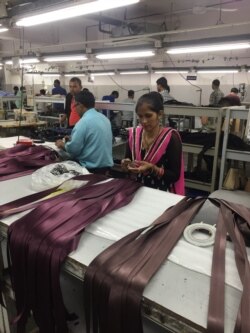Since starting out with exports of leather gloves over three decades ago, business has boomed at Alpine Apparels, a leather goods factory on New Delhi's outskirts. Sanjay Leekha's family-owned business has diversified into accessories such as handbags, belts and jackets, with some designs being inspired by Indian craft.
But Leekha fears that business could be hit after the U.S. scrapped concessional tariffs for these products, as American buyers will want him to compensate for the higher duties.
"It is not easy because the margins have never really been built in to handle an additional 4 to 10 percent reduction in cost," he said. He worries that business could shift to other countries "in case we are unable to make the price reductions and the customers are not able to absorb the increased cost."
The trade row between India and the U.S. has heated up since June, when Washington ended trade privileges that allowed over $6 billion of Indian imports to enter with lower or zero duties under a program known as the Generalized System of Preferences (GSP). India was the biggest beneficiary of the trading agreement that was meant to help more than 120 developing countries grow their economies.
New Delhi retaliated by raising tariffs on 28 American items, such as apples, almonds and walnuts.
Complaints of protectionism
At the heart of the deepening trade dispute are Washington's complaints of protectionist measures by India and demands that New Delhi lower tariffs and give more access to Indian markets, making it possible to bridge their $21 billion trade deficit.
U.S. President Donald Trump has frequently called out New Delhi for levying high tariffs.
"India has long had a field day putting tariffs on American products. No longer acceptable!" Trump wrote on Twitter before trade representatives from the two countries held talks recently to iron out their differences. There was no breakthrough, but both sides are expected to hold another round of talks this month.
The trade spat may not be good news for the 1,000-plus workers busy putting together bags and other goods at Alpine Apparels.
"A loss of business obviously means loss of jobs, loss of livelihood to the many people that industries like us employ. So it is a situation which is worrying," Leekha said.
He says the withdrawal of GSP benefits has taken away optimism that exporters like him could be at an advantage from the U.S.-China trade spat by wooing some business their way. In highly competitive industries like his, the business will flow to countries like Vietnam that still enjoy concessionary tariffs.
Many of the industries impacted are labor-intensive, such as leather and gems and jewelry, for which the U.S. was their biggest market.
"If industry is going to lose the U.S. market, whether they will gain in some other market or they will concentrate in domestic market is an issue," said Ajay Sahai, director general of the Federation of Indian Export Organizations. "From that perspective, for some products we may have to look at how these companies can be given some kind of handholding so that they continue to provide employment in the country."
Dispute could 'easily escalate'
Indian officials have told their U.S. counterparts that the trade deficit is shrinking as New Delhi increases purchases such as defense equipment and shale oil from the U.S. American imports have increased by 80 percent over the last decade.
"Last year alone, our imports from the U.S. have gone up from $24 billion to $34.6 billion," Sahai said. "So I am pretty sure trade deficit will shrink in years to come, and I will not be surprised if in 10 or 15 years down the line it is the other way round."
But unraveling the trade dispute may not be easy.
The U.S. wants more access for its dairy products and medical devices. It has also expressed concerns about government policies by New Delhi that the U.S. views as protectionist — rules on data usage that could restrict companies like Mastercard and American Express, and e-commerce rules meant to protect local traders who complain of losing business to companies like Walmart and Amazon.
"I think it could easily escalate," said Biswajit Dhar at New Delhi's Jawaharlal Nehru University, pointing out the U.S. will insist on some concessions.
But lowering barriers may not be easy for New Delhi at a time when its own economy is struggling to grow, its farm sector is distressed and jobs are scarce.
"India has very little headroom," Dhar said. "I don't see India doing anything due to the political compulsions it has. The trouble for the government is that we are now seeing unemployment at unprecedented levels."
Some have called it the mini-trade war — India-U.S. bilateral trade of $142 billion pales in comparison to U.S.-China trade. But the question being asked is: Will the trade spat cast a shadow on a strategic partnership that both sides want to deepen to counterbalance China?












